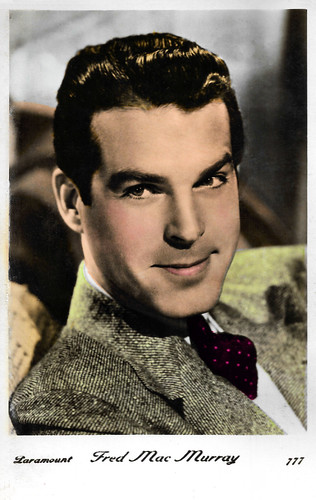
French postcard, no. 777. Photo: Paramount.
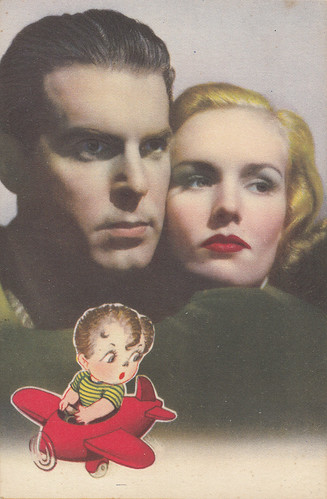
Portuguese postcard by Postais Krohn, Porto. Frances Farmer and Fred MacMurray in Exclusive (Alexander Hall, 1937). Collection: Marlene Pilaete.
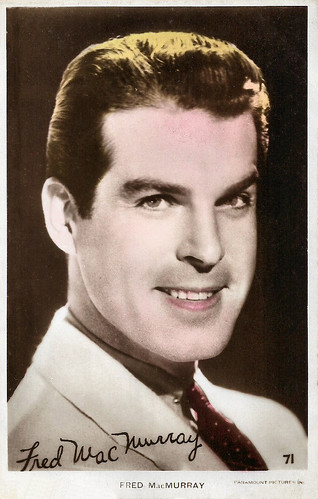
British postcard by Art Photo, no. 71. Photo: Paramount Pictures.

American postcard by Godfrey Herbert, The World Explorer, 1941. Photo: Paramount.
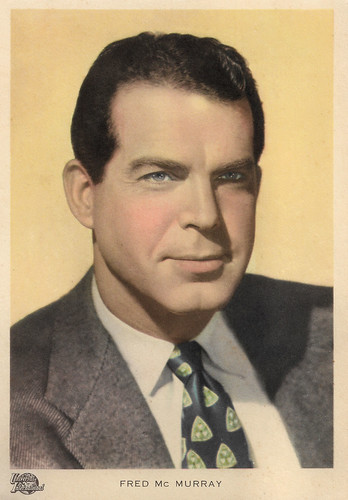
Italian postcard by GM. Photo: Universal-International.
The initial model for Captain Marvel
Fred Martin MacMurray was born in Kankakee, Illinois, in 1908. He was the son of Maleta (née Martin) and concert violinist Frederick Talmadge MacMurray. His aunt, Fay Holderness, was a vaudeville performer and actress. Before MacMurray was two years old, his family moved to Madison, Wisconsin, where his father taught music. They then relocated within the state to Beaver Dam, where his mother had been born. He later attended school in Quincy, Illinois, before earning a full scholarship to Carroll College in Waukesha, Wisconsin.
At Carroll, MacMurray played the saxophone in numerous local bands. He did not graduate from college. In 1930, he played saxophone in Gus Arnheim and his Cocoanut Grove Orchestra when Bing Crosby was the lead vocalist and Russ Columbo was in the violin section. As a featured vocalist, he recorded in 1930 with the Gus Arnheim Orchestra on 'All I Want Is Just One Girl' on the Victor label and with George Olsen on 'I'm In The Market For You' and 'After a Million Dreams'.
MacMurray's musical aspirations eventually led him to Hollywood, where he frequently worked as an extra. He later joined the California Collegians and with them, he appeared on Broadway in the hit production 'Three's a Crowd' (1930-1931) starring Sydney Greenstreet, Clifton Webb, and Libby Holman. He joined Holman on a duet of 'Something to Remember Me By'. He subsequently appeared in 'The Third Little Show' and alongside Sydney Greenstreet and Bob Hope in another hit show, 'Roberta' (1933-1934). In 1934, he signed with Paramount Pictures for the then-standard 7-year contract. At Paramount, he rose to fame in The Gilded Lily (Wesley Ruggles, 1935), a romantic comedy with Claudette Colbert. Seemingly overnight, he was among the hottest young actors in town, and he quickly emerged as a favourite romantic sparring partner with many of Hollywood's leading actresses.
Although the majority of his films of the 1930s can largely be dismissed as standard fare, there are exceptions. Later in the 1930s, MacMurray worked with film directors Billy Wilder and Preston Sturges and actors Barbara Stanwyck, Henry Fonda, Humphrey Bogart, Marlene Dietrich, and, in seven films, Claudette Colbert. He co-starred with Katharine Hepburn in Alice Adams (George Stevens, 1935), with Joan Crawford in Above Suspicion (Richard Thorpe, 1943), and with Carole Lombard in four productions: the screwball comedy Hands Across the Table (Mitchell Leisen, 1935), the mystery-comedy The Princess Comes Across (William K. Howard, 1936), the comedy-drama Swing High, Swing Low (Mitchell Leisen, 1937), and the screwball comedy True Confession (Wesley Ruggles, 1937).
Usually, he was cast in light comedies as a decent, thoughtful character, such as in The Trail of the Lonesome Pine (Henry Hathaway, 1936), an ambitious early outdoor 3-strip Technicolour hit with Henry Fonda. MacMurray spent the decade learning his craft and developing a reputation as a solid actor. In 1939, artist C. C. Beck used MacMurray as the initial model for the superhero character who became Fawcett Comics' 'Captain Marvel'. The 1940s gave him his chance to shine. MacMurray became one of Hollywood's highest-paid actors of the period. By 1943, his annual salary had reached $420,000, making him the highest-paid actor in Hollywood and the fourth-highest-paid person in the nation. He scored a huge hit with the thoroughly entertaining The Egg and I (Chester Erskine, 1947), again teamed with Claudette Colbert and today largely remembered for launching the long-running Ma and Pa Kettle franchise.
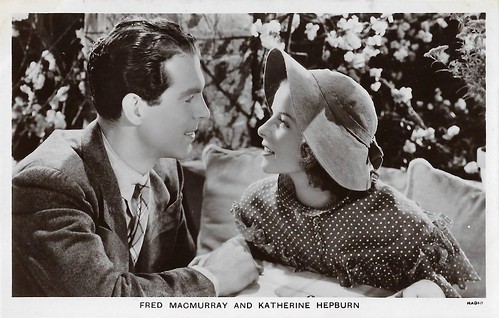
British postcard in the Film Partners, no. 183. Photo: RKO Radio Pictures. Fred MacMurray and Katharine Hepburn in Alice Adams (George Stevens, 1935).
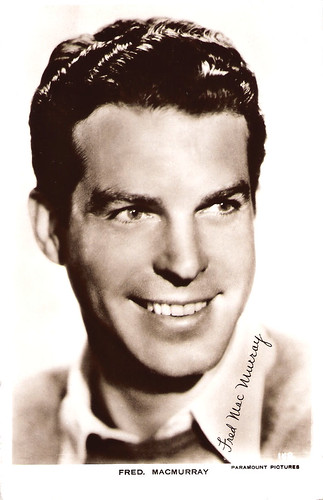
British Real Photograph postcard, no. 168. Photo: Paramount Pictures.
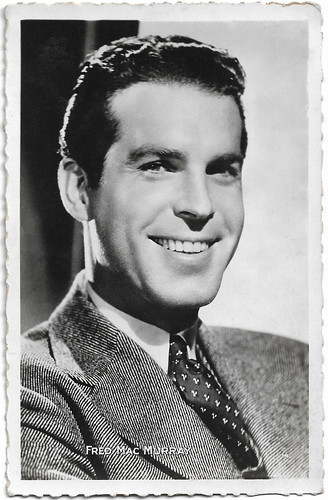
French postcard by Editions Chantal, no. 14 A.

French postcard by Viny, no. 2102. Photo: Paramount Pictures.

British Real Photograph postcard, no. 168A. Photo: Paramount Pictures.

German postcard by Ross Verlag, no. A 2948/1, 1939-1940. Photo: Paramount.
Better when cast against type
Despite being typecast as a 'nice guy', Fred MacMurray often said his best roles were when he was cast against type, such as under the direction of Billy Wilder and Edward Dmytryk. Perhaps his best-known 'bad guy' performance was that of Walter Neff, an insurance salesman who plots with a greedy wife (played by Barbara Stanwyck) to murder her husband in the Film Noir classic Double Indemnity (Billy Wilder, 1944).
Another stellar turn in this category is MacMurray's cynical, spineless Lieutenant Thomas Keefer in Edward Dmytryk's The Caine Mutiny (1954). Six years later, MacMurray played Jeff Sheldrake, a two-timing corporate executive in Wilder's Oscar-winning romcom The Apartment (Billy Wilder, 1960) with Jack Lemmon and Shirley MacLaine. Throughout the mid-1950s, he appeared primarily in low-budget action pictures, most of them Westerns. In 1958, he guest-starred in the premiere episode of NBC's Cimarron City Western series, with George Montgomery and John Smith. MacMurray's career continued upward the following year when he was cast as the father in the Disney Studios live-action comedy, The Shaggy Dog (Charles Barton, 1959). The film was an enormous hit.
Then, from 1960 to 1972, he starred on television in My Three Sons, a long-running, highly rated series. Concurrent with My Three Sons, MacMurray stayed busy in films, starring as Professor Ned Brainard in Disney's The Absent-Minded Professor (Robert Stevenson, 1961) and in the sequel Son of Flubber (Robert Stevenson, 1963). MacMurray was nominated for a Golden Globe for The Absent-Minded Professor (Robert Stevenson, 1961). Using his star-power clout, MacMurray had a provision in his My Three Sons contract that all of his scenes on that series were to be shot in two separate month-long production blocks and filmed first. That condensed performance schedule provided him more free time to pursue his work in films, maintain his ranch in Northern California, and enjoy his favourite leisure activity, golf.
Over the years, MacMurray became one of the wealthiest actors in the entertainment business, primarily from wise real estate investments and from his "notorious frugality". After the cancellation of My Three Sons in 1972, MacMurray made only a few more film appearances and one last feature, The Swarm (Irwin Allen, 1978), before retiring. A lifelong heavy smoker, MacMurray suffered from throat cancer in the late 1970s, and it reappeared in 1987. He also suffered a severe stroke during Christmas 1988, which left his right side paralysed and his speech affected, although with therapy, he was able to make a ninety per cent recovery.
After suffering from leukaemia for more than a decade, Fred MacMurray died from pneumonia at age 83 in 1991 at his home in Santa Monica, California. His body was entombed in Holy Cross Cemetery. In 2005, his widow, actress June Haver, died at age 79, and her body was entombed with him. MacMurray was married twice. He married dancer Lillian Lamont (legal name Lilian Wehmhoener MacMurray) in 1936, and the couple adopted two children, Susan (1940) and Robert (1946). After Lamont died of cancer in 1953, he married June Haver the following year. The couple subsequently adopted two more children - twins born in 1956 - Katherine and Laurie. MacMurray and Haver's marriage lasted 37 years, until Fred's death.

Spanish postcard by Belfo, no. 133. Ava Gardner and Fred MacMurray in Singapore (John Brahm, 1947). Collection: Marlene Pilaete.
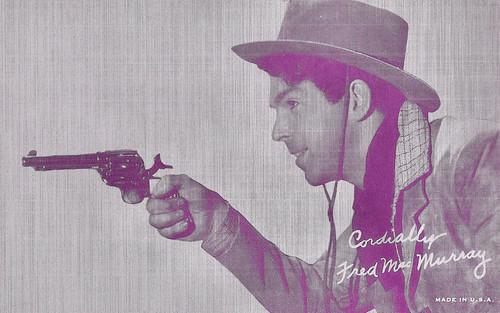
American Arcade card.

American Arcade card.

American Arcade card.
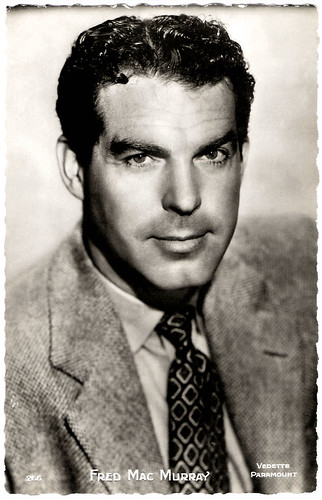
French postcard by Editions P.I., Paris, no. 266. Photo: Paramount Pictures, 1946.
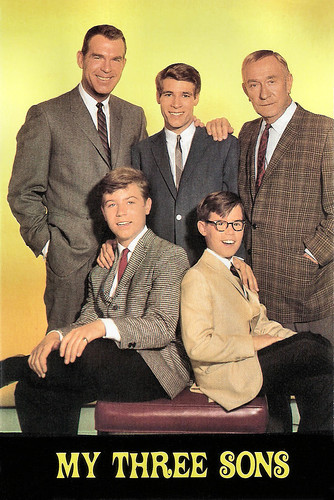
American postcard by The American Postcard Co. Inc., no. TV 81, 1984. Photo: Viacom International Inc. Fred MacMurray as Steve Douglas, Don Grady as Robbie, Stanley Livingston as Chip, Barry Livingston as Ernie, and William Demarest as Bub O'Casey in the TV series My Three Sons (1960-1972).
Sources: Jason Ankeny (AllMovie), Wikipedia, and IMDb.
This post was last updated on 19 April 2025.
No comments:
Post a Comment